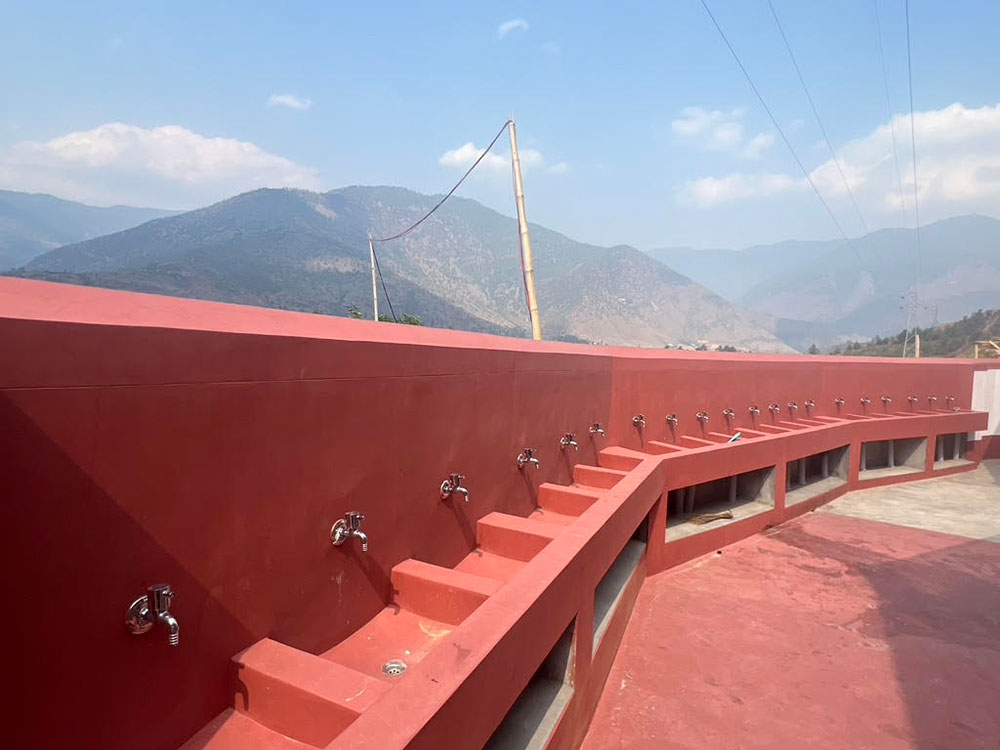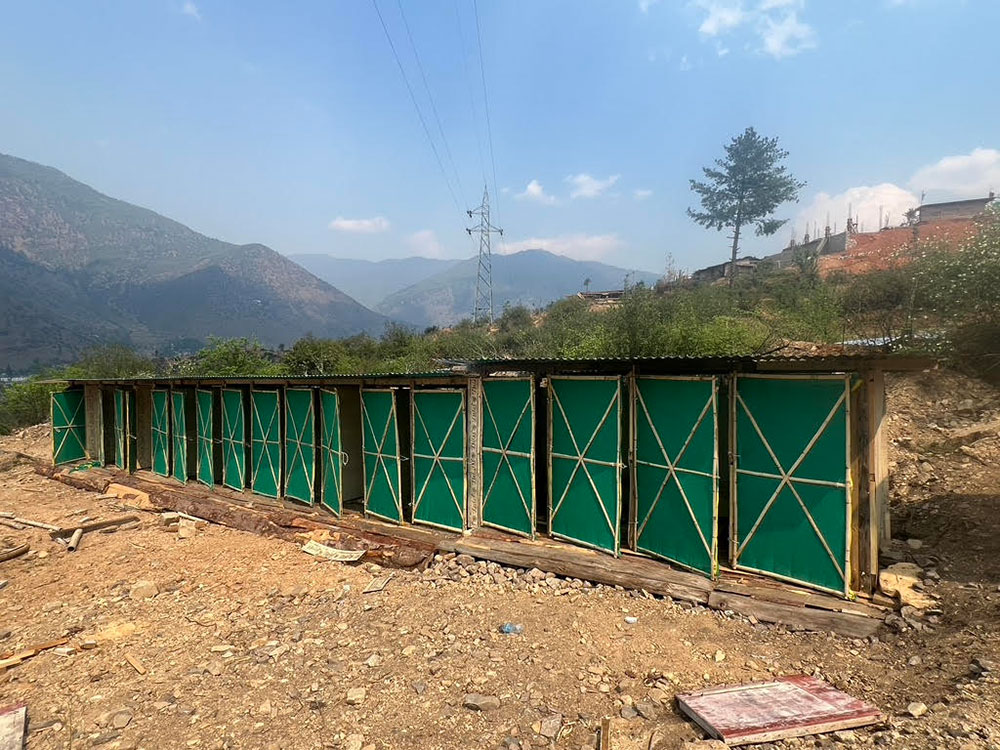At Kuenselphodrang, Thimphu, there used to be a problem. While people gathered for spiritual events such as Kuenkhen Kabum, there was a not very clean situation: some relieve themselves openly, instead of using proper facilities.
The green bushes and forests saw the messy result of thousands of worshippers, showing a big problem in dealing with water, sanitation, and hygiene (WASH) during religious events. In November 2022, when people gathered for blessings and teachings, the area near Kuenselphodrang looked like a messy battlefield. There were not enough toilets – only 60 for more than 15,000 people. Worshippers had to share facilities, which wasn’t hygienic. The strong stench made the ceremony an unpleasant experience.


Ugyen Pema Zangdopelri Chhoetshog has constructed 64 pit toilets for men and 56 for women, and installed over 60 water taps with wash basins for the upcoming Rinchen Terzoed Wangchhen event in Bondey, Paro
Problem with WASH is not new, if not the biggest hurdle in coordinating mass gathering like at Moenlam chenmos, wang ceremonies or even at tshechus.
Even though the government supported the National Sanitation and Hygiene Policy 2020 and created the National Public Toilet Guidelines 2021 (NPTG), Bhutan is still faced with problems with open defecation. This was true even after the country was declared Open Defecation Free (ODF) in 2022.
These incidents raised concerns about whether the WASH provisions were enough and who was responsible for making sure guidelines were followed.
“Not paying attention to this issue affects not just the environment but also people’s health and dignity,” said Pema Dorji, who attended an event in Sarpang. “The sight of open defecation and pollution goes against Bhutan’s goal of overall well-being.”
The repeated problems with WASH during gatherings show that there’s a need for better policies and actions to ensure sanitation keeps up with the needs of large crowds.
Learning from shortcomings
Despite past problems, there’s hope for improvement. As thousands of worshippers get ready to gather for the upcoming Rinchen Terzoed Wangchhen event in Bondey, Paro, organisers are already worried about WASH issues.
Considering the problems, the organisers have WASH as a priority. The coordinator, Khentrul Karma Jigme, said that over 50 modern toilets with water closets for VIPs, trulkus, lamas, and monks had been built.
“We also set up 64 pit toilets for men and 56 for women on private land. Furthermore, we’ve designated a space above the male toilets for urination that can accommodate more than 200 people at a time.”
To further improve sanitation, the organiser has installed over 60 water taps with wash basins on both sides of the Wangkhang. Khentrul emphasised the importance of maintaining cleanliness during the peak monsoon.
“We need to ensure the well-being of the worshippers. There will be 20 individuals to clean and oversee the toilets and other sanitation services throughout the Wangchhen event.”
Khentrul said that since Paro was a popular tourist destination, it was essential to keep the area clean and tidy.
The dzongkhag health sector is actively involved in supporting and managing sanitation and logistics for the attendees to access basic facilities.
Dzongkhag Health Supervisory Officer (DHSO), Karma Chedup, said that since the public kitchen was close to the restrooms, sanitation would be monitored regularly. An emergency health camp will also be established within the Zangdopelri complex to provide medical care services to the attendees.
Organisers said that these sanitation and hygiene initiatives weren’t driven by policy intervention or regulations but rather by learning from past experiences. They aim to set a precedent for future gatherings across Bhutan, prioritising the well-being of attendees and the cleanliness of the environment.
Shechen Rabjam Rinpoche is scheduled to confer the empowerment of Rinchen Terzoed from May 29 to September 13.
Urgent call for behavioural change
Referring to the difficulties encountered in the past at Kuenselphodrang, the Religion and Health project manager of Zhung Dratshang, Kinley Penjor, said that despite the construction of 22 urinal units and 38 toilet units for devotees attending the empowerment of Kuenkhen Kabum, many still chose to urinate and defecate in the open.
Kinley Penjor said that in consideration of female devotees, the dratshang also supplied waste bins and plastic bags for sanitary pads. However, users ended up throwing them inside the toilets, causing blockages.
Kinley Penjor expressed concern, stating, “Unless people change their behaviors and abandon traditional cultural practices of defecating in open spaces, simply having thousands of public toilets and strict regulations won’t solve the problem.”
As outlined in the national public toilet guidelines, ensuring the availability of well-designed and easily accessible public toilets at public areas, historical sites, and along highways has become increasingly important due to urbanisation and population growth.
The guidelines highlight that the existing public toilets are often poorly designed, poorly maintained, and unhygienic. This situation often forces people to resort to open defecation when they are away from home.
Contributed by
Rinzin Wangchuk



